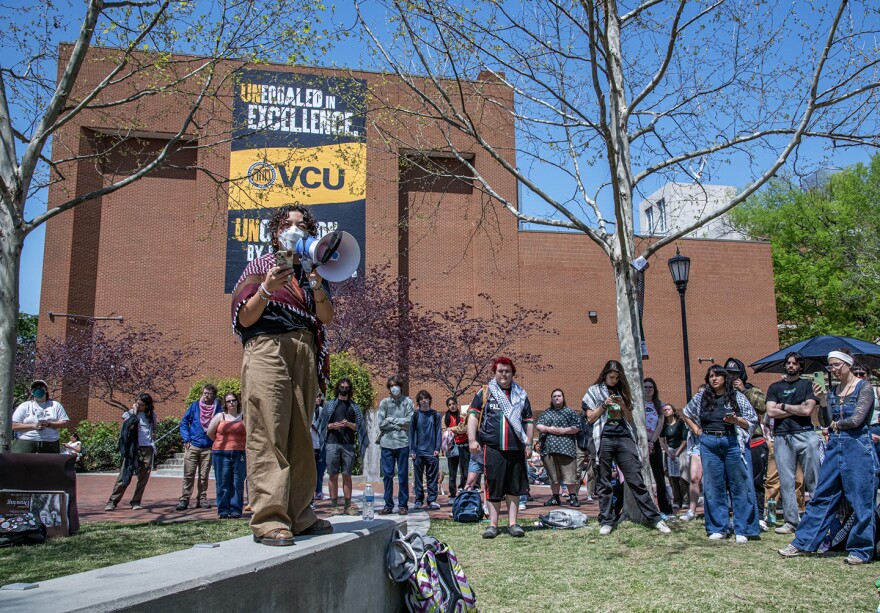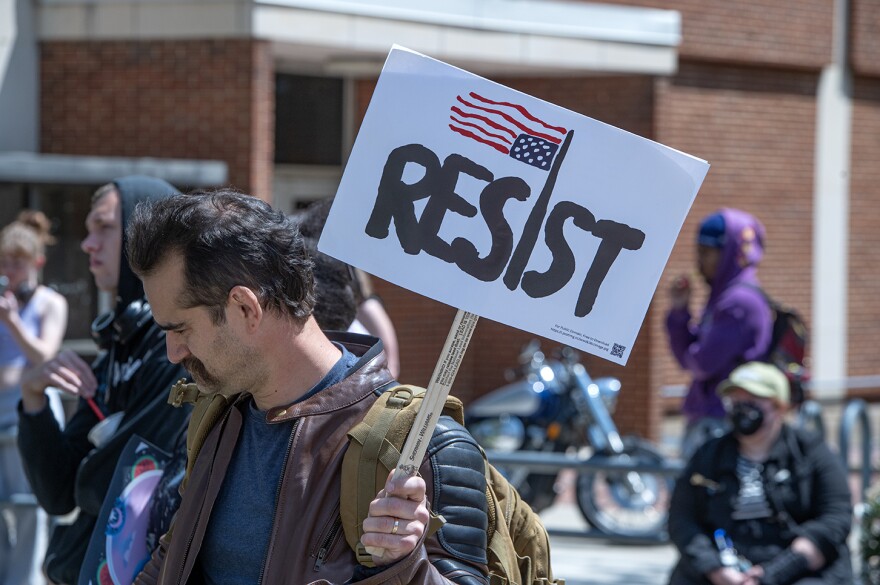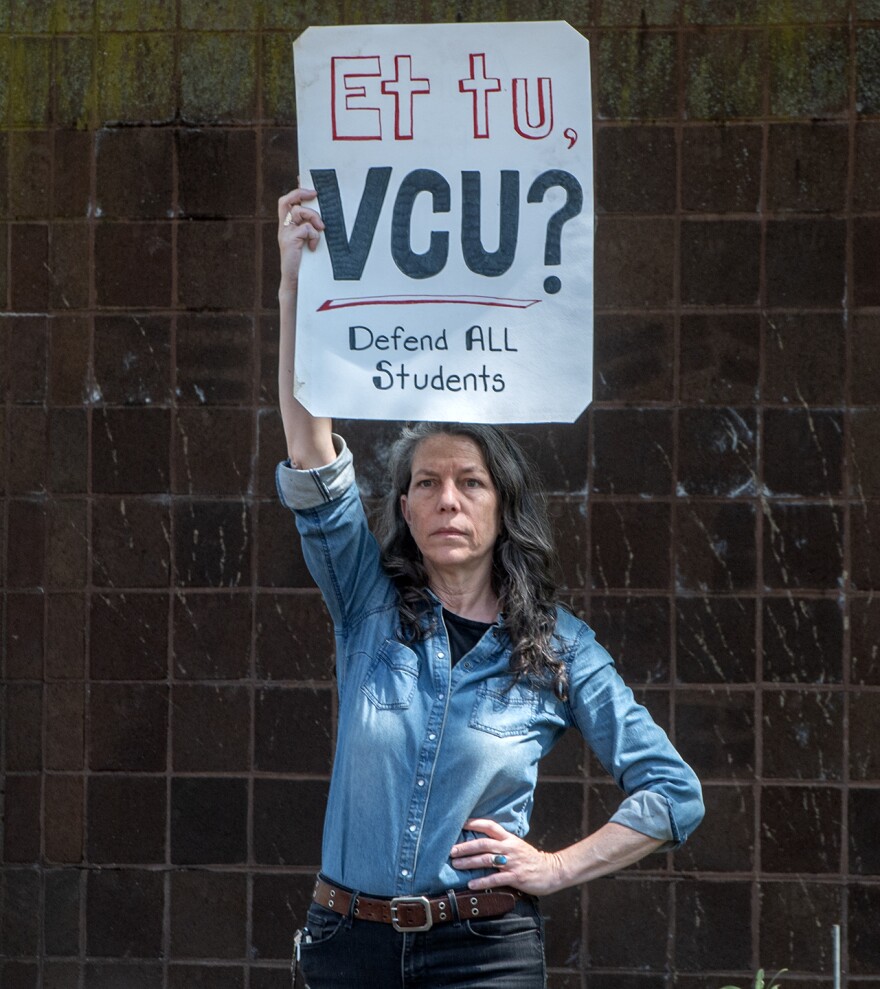Updated, April 23: Mark Owczarski, interim vice president of communications and marketing at Virginia Tech, confirmed to VPM News Monday, April 21, that as of last Friday (April 18), the university had also identified five recent graduates who have had their legal statuses impacted. That brings the total number of those impacted at Virginia Tech to 19 — and at least 40 statewide.
Over 100 people chanted “hands off our students now” during an April 14 protest on Virginia Commonwealth University’s campus, in response to the termination of about three dozen student and alumni visas on Virginia campuses in recent days by President Donald Trump’s administration.
The protest was organized by VCU’s Students for Justice in Palestine group, which has been organizing regular protests over the war in Gaza.
Kenza Zitouni, one of the organizers, said VCU students are standing in solidarity with the two international students and one recent graduate who recently had their visas revoked. Zitouni called the revocations part of a “calculated attempt to intimidate and discourage dissent against the imperialist war machine.”
“These three students are part of a larger growing population across the U.S., and students are being punished for not being from here,” Zitouni said.
The percentage of international students on public four-year Virginia campuses has grown from 5.4% to nearly 7% over the last 10 years, according to state data.
Michael Porter, VCU’s associate vice president for public relations, told VPM News the overall number of students impacted hasn’t changed from last week’s official tally. University of Virginia spokesperson Bethanie Glover said there had been no additional revocations beyond three cancellations UVA became aware of on April 4: one student and two recent graduates.
However, more students at George Mason have been impacted: The Richmond Times-Dispatch reported on April 10 that 10 GMU students had had their visas canceled. Since that report, the number has increased to 15.
The numbers reported last week by Virginia Tech have also increased. According to Mark Owczarski, interim vice president of communications, four undergraduate students and 10 graduate students have had visas or visa eligibility documentation terminated as of April 16.
Noah Miller, a VCU senior who attended Monday's protest, said the cancellations are “an egregious violation of student rights.” Miller and others called on the school to take a stand against the visa revocations; establish a sanctuary campus; and not cooperate with federal immigration officials. It’s a call students at other universities across the country have been making.

“The necessity for sanctuary campuses is just as urgent now as it was 40 years ago,” said Zitouni. “Protections against federal authorities have historically come from the community.”
In an April 4 email obtained by VPM News, VCU officials wrote to international students that “Immigration and Customs Enforcement (ICE) officials are legally allowed to approach you in public and ask to see evidence” in compliance with a new federal mandate.
“If they do so, you must show the evidence to them even if they do not have a warrant,” the email states, though it notes that students do not have to answer questions and have the right to remain silent.
The email also says students are responsible for paying their own legal fees. It notes that VCU cannot refer students to a specific immigration attorney, but directs them to a lawyer referral service operated by the Virginia State Bar.
Students protesting Monday said that was unacceptable and called for the university to establish a fund to assist students in need of legal aid.
“I think students — specifically, international students — put their trust into a university that labels itself as diverse and prides itself on that, and instead of standing with them and protecting them, VCU turned their backs on them,” said Sereen Haddad, another protest organizer.
Zitouni told VPM News that the international students they’ve heard from are taking things day by day and trying to get in touch with immigration lawyers.
One international student at VCU who hasn’t had their visa canceled said they’ve been living in a constant state of uncertainty and fear of deportation over the last few months.
“No one has the answer, and you just have to prepare for the worst,” they said. “I started packing my stuff as if we will be deported, like, anytime soon.”
VPM News reached out to Jewish Life at VCU and the Progressive Jewish Student Union for comment about the recent protest over visa cancellations, but did not receive a response from either group by deadline.

Little information given for many visa revocations
Legal experts VPM News spoke with said while many of the visa cancellations don’t cite specific reasons, some appear to be attributed to minor legal infractions — like traffic violations.
Jon Velie, an immigration attorney based in Oklahoma, told VPM News he plans to file a federal lawsuit in New Jersey on behalf of nine international students in the US who’ve had their visas revoked.
“The reasons that all of our students were revoked was either not given or noted as criminal,” Velie said.
One plaintiff is a law student at an Ivy League school whose visa was revoked because of a 10-year-old traffic ticket, according to Velie.
Another one of Velie’s clients said his visa was revoked over an argument with his girlfriend, despite no charges ever being filed.
The lawsuit, Velie said, claims violations of the students’ constitutional right to due process under the Fifth Amendment; their right to a trial under the Sixth Amendment; and the Administrative Procedure Act.
Velie, who is asking for a temporary restraining order to halt the revocations, said he expects to bring on other clients. He told VPM News that he’s spoken to 300 students in the last week, some of whom he believes are from Virginia, and many are “in the same position” because of minor infractions.
“It's definitely impacting students from Virginia and probably every other state,” Velie said.

Other students who claim they were denied due process have filed lawsuits challenging their visa cancellations. Federal judges have granted temporary restraining orders to students in some cases, including in New Hampshire and Wisconsin.
The trend of minor infractions like traffic violations among students targeted for visa terminations was also recently reported by The New York Times; attorneys told the Times that minor violations don’t usually result in deportations. USA Today also reported that some cancellations appeared to be connected to things like roommate disputes and off-campus traffic tickets.
A source familiar with the situation at Virginia Tech told VPM News they’ve also seen a trend of traffic violations among the students whose visa eligibility documents were terminated.
The mass round of visa and eligibility document terminations have impacted at least 1,400 students across the country, according to reports compiled by NAFSA: Association of International Educators.
Miriam Feldblum, CEO of the Presidents’ Alliance on Higher Education and Immigration, told VPM News that many terminations “upend regular practice” because colleges, not federal officials, are usually the ones to make changes to students’ I-20 documentation — which sets up their eligibility for a student visa.
For example, if students don’t take as many courses as they are supposed to, schools have the ability to terminate a student’s legal status eligibility.
And while the cancellations are impacting a small fraction of the total international student population — there are over 1 million international students nationwide — the situation “is creating a climate of fear, anxiety and uncertainty that goes well beyond those immediately impacted because of the suddenness, the lack of explanation, the lack of a genuine process to make corrections, to request appeals,” she added.
Feldblum said she thinks the federal government may be using artificial intelligence to scrape databases, given the trend of low-level civil and criminal violations being cited in visa terminations — and because she’s heard of terminated students who’ve had charges dismissed, or were victims in the cases.
“This appears to be a retroactive sweeping of all kinds of criminal justice databases that the US government can have access to,” Feldblum said.
Axios has reported the government’s use of AI to sweep students’ social media accounts to flag those “who appear to support Hamas or other designated terror groups.”
Some of Velie’s clients have had their employment authorization documents revoked, and he said the federal government has sent some emails asking them to “self-deport.”
Pablo Pérez Salido, a Texas-based immigration attorney, said the US State Department has heightened its scrutiny of student visa recipients’ conduct to re-evaluate whether they can stay in the country.
This move is within the State Department’s authority, Pérez Salido told VPM News, adding that the law “does not necessarily ask for good cause to be shown” when it revokes a student visa.
Despite this, Pérez Salido said the federal government’s grounds for revocation can’t violate people’s due process and constitutional rights.
“Of course, we're seeing outrageous cases, like the ones for people that exercise their First Amendment rights within the U.S. jurisdiction,” he said, noting the cases of students who’ve lost their F-1 visas or legal status over protests on college campuses.
Pérez Salido said he’s seen local and state authorities communicating more with the federal government about student visa recipients, sharing details about potential crimes and other conduct that could be used to justify a revocation.
Delivering the message
Velie and Pérez Salido both told VPM News that some clients at their law firms have said they — and their schools — have not been notified about visas being revoked, raising fears that they could be detained by federal agents without even knowing their legal status has changed.
Feldblum told VPM News the only way university officials are becoming aware of the terminations is by manually checking SEVIS, a database maintained by federal officials, daily.
Amid these actions, Virginia public colleges’ messaging to students about the topic has varied widely.
Some, like UVA, have posted public guidance. UVA’s guidance states that students aware of any immigration enforcement action impacting them should contact the university.
“UPD will make every effort to ensure that any immigration enforcement action conducted on or near UVA Grounds and involving members of the UVA community adheres to relevant laws,” the message states.
Multiple universities, including UVA and VCU, are reminding students to carry their official documentation authorizing them to live and work in the U.S. at all times.
GMU President Gregory Washington said in a Tuesday message to students that the university had “no role in facilitating” visa terminations for 15 students and was not notified of them beforehand.
GMU reached out to federal authorities “to learn what process is being used to identify students for revocations. So far, no answers have been given,” Washington wrote to students.
The Fairfax County–based university is in direct contact with students to provide support and the students are being advised to speak with academic deans to see “what options they may have to complete their coursework. The Provost’s Office is encouraging faculty to work with students who may be found in these situations, providing as much flexibility as possible.”
Most university spokespeople at Virginia’s four-year public colleges did not answer VPM News’ questions about cooperation with ICE — or what support, if any, is being extended to international students amid the visa cancellations.
Suzanne Clavet, director of media relations for the College of William & Mary, told VPM News that the university has not entered into formal agreements for cooperation with ICE or “received any letter from the government about visas.”
The terminations so far appear to be impacting a handful of Virginia’s public four-year institutions.
Spokespeople at James Madison University; University of Mary Washington; Longwood University; Radford University; Virginia State University; and the Virginia Military Institute all confirmed with VPM News that as of Wednesday, April 16, no international students or recent graduates have had their visas revoked — to their knowledge.
VPM News did not hear from Old Dominion University, Christopher Newport University or the University of Virginia’s College at Wise by deadline Thursday. Last week, a Norfolk State University spokesperson told VPM News they hadn’t had any students impacted thus far.
Jack Glagola contributed reporting.


















